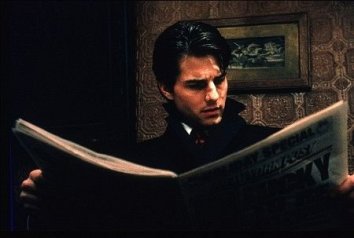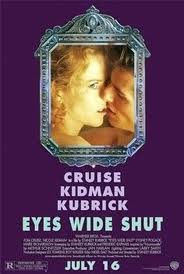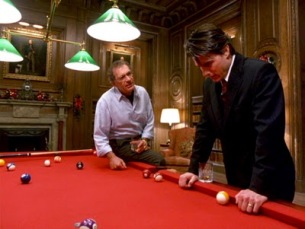“No dream is ever just a dream.”
January 22, 2011 § Leave a comment
A man ventures out on a midnight journey through downtown New York City on an odyssey to discover what is real and what is illusionary in his life. Everything he previously thought was true, has been revealed to be a lie. Nothing is as it seems, and the night’s journey will hold for him an encounter with the seamy underside of the city, the nightmarish figure of his worst self, and even, perhaps, the satanic.

Such is the plot of Stanley Kubrick’s 1999 magnum opus, Eyes Wide Shut. The movie is part neo-noir, part surrealist journey, and part exploration of infidelity, and universally panned by the average layman. It’s true. Eyes Wide Shut is seen by many as the biggest misstep of Kubrick’s illustrious career. Still holding the Guinness World Record for  “Longest Constant Movie Shoot” at 400 days and spending more than a year in post-production hell, EWS is also notable for being the movie that ended Kubrick’s career, as he died just four days after submitting it to Warner Bros. Though the film initially opened to generally positive reviews in 1999, it quickly drew scorn from all sides. The extravagance of the shoot, the rumored difficulties between then-married stars, Tom Cruise and Nicole Kidman, and the decidedly slow pacing and confusing plot all drew attention away from what the movie was actually trying to do and say.
“Longest Constant Movie Shoot” at 400 days and spending more than a year in post-production hell, EWS is also notable for being the movie that ended Kubrick’s career, as he died just four days after submitting it to Warner Bros. Though the film initially opened to generally positive reviews in 1999, it quickly drew scorn from all sides. The extravagance of the shoot, the rumored difficulties between then-married stars, Tom Cruise and Nicole Kidman, and the decidedly slow pacing and confusing plot all drew attention away from what the movie was actually trying to do and say.
Perhaps the biggest flaw of the movie is that is nearly impossible to appreciate on first viewing. Many (if not all) of Kubrick’s films become much better with repeated viewing, as each viewing reveals some other part of Kubrick’s unique vision, and EWS is no different. The problem though, is that after initially watching the film, no one in their right mind will actually want to watch it again. The movie is ridiculously complicated, the story nearly incomprehensible  without some knowledge of the original source material (an obscure, turn-of-the-century, Austrian novella entitled “Dream Story”), and Nicole Kidman’s performance so appallingly dreadful that it turns the most casual viewers off. I first saw the film about two years ago and by the end of it, had no idea what the movie was trying to say or any desire to dwell on it long enough to figure it out. Flash-forward two years to Christmas break; I find myself up at 2am, pursuing Netflix’s Instant-Watch for something that isn’t another episode of Law & Order: SVU and I stumble across EWS. Thinking to myself that at least I’d get to see Nicole Kidman act in a completely over-the-top manner, I settled in to watch it.
without some knowledge of the original source material (an obscure, turn-of-the-century, Austrian novella entitled “Dream Story”), and Nicole Kidman’s performance so appallingly dreadful that it turns the most casual viewers off. I first saw the film about two years ago and by the end of it, had no idea what the movie was trying to say or any desire to dwell on it long enough to figure it out. Flash-forward two years to Christmas break; I find myself up at 2am, pursuing Netflix’s Instant-Watch for something that isn’t another episode of Law & Order: SVU and I stumble across EWS. Thinking to myself that at least I’d get to see Nicole Kidman act in a completely over-the-top manner, I settled in to watch it.

 The film immediately hooked me, to the point that as soon as it was finished, I watched it again immediately so that I could study it in detail. What I realized as I was watching it through the third time, is that EWS was essentially trying to make the same point that another, more recent film was also trying to make. That film? Christopher Nolan’s Inception. Now, before I lose you completely and you think that I’m insane for even suggesting that Inception, with its multi-layered plot and CGI effects, could have any relation at all to Stanley Kubrick’s movie about sex clubs and the dangers of casting married actors, hear me out. I merely wish to suggest that what Inception ultimately says
The film immediately hooked me, to the point that as soon as it was finished, I watched it again immediately so that I could study it in detail. What I realized as I was watching it through the third time, is that EWS was essentially trying to make the same point that another, more recent film was also trying to make. That film? Christopher Nolan’s Inception. Now, before I lose you completely and you think that I’m insane for even suggesting that Inception, with its multi-layered plot and CGI effects, could have any relation at all to Stanley Kubrick’s movie about sex clubs and the dangers of casting married actors, hear me out. I merely wish to suggest that what Inception ultimately says about the relation of dreams to reality is the same as what EWS says. In Inception, Leonardo DiCaprio’s Cobb comes to the conclusion that he no longer needs to question his reality because he no longer wonders if the dream is more real than world around him. This is essentially the same conclusion that Bill and Alice Harford come to at the conclusion of EWS. That no matter what they may have experienced or felt previously, the only thing that has to affect them is the future.
about the relation of dreams to reality is the same as what EWS says. In Inception, Leonardo DiCaprio’s Cobb comes to the conclusion that he no longer needs to question his reality because he no longer wonders if the dream is more real than world around him. This is essentially the same conclusion that Bill and Alice Harford come to at the conclusion of EWS. That no matter what they may have experienced or felt previously, the only thing that has to affect them is the future.
Bill Harford: Are you sure of that?
Alice Harford: Am I sure? Only as sure as I am that the reality of one night, let alone that of a whole lifetime, can ever be the whole truth.
Bill Harford: And no dream is ever just a dream.
Bill Harford’s journey really begins when he and his wife are invited to the Christmas party of a wealthy patient, Victor Zeigler. While at the party, two things happen that will forever change Bill’s life. The first is that he runs into an old friend from medical school who is playing piano for the party and the second is that Bill is called upstairs by Zeigler to attend to a prostitute who has overdosed in his bathroom. It is in this scene early on that Kubrick establishes the opposition between Zeigler and Bill. Zeigler represents the worst self that Bill could possibly be. He is cold, unfeeling, unfaithful, and as Bill comes to discover, he is involved with the underground cult that Bill will infiltrate later on. Indeed, the whole atmosphere of the Christmas part only comes to serve as a kind of mask to the orgy that Bill discovers later on in the film.
It is in this scene early on that Kubrick establishes the opposition between Zeigler and Bill. Zeigler represents the worst self that Bill could possibly be. He is cold, unfeeling, unfaithful, and as Bill comes to discover, he is involved with the underground cult that Bill will infiltrate later on. Indeed, the whole atmosphere of the Christmas part only comes to serve as a kind of mask to the orgy that Bill discovers later on in the film.
It may seem coincidental that the host of the party attended by Bill should be involved in the cult later on and that the piano player, whom Bill just happens to know, is playing both, and in fact much of the movie seems to hinge upon whether or not Bill’s journey through New York, his encounter with a poor prostitute, the run-in with his piano player friend, and his appearance at the mansion of the cult are all merely coincidence or if there is some greater plan at work in his life.
What I would like to propose, is that Bill’s entire odyssey during the night is in fact all a dream, an illusion of his mind as he tries to deal with a single, stunning revelation: that his wife could have been unfaithful. It is this single thought that comes to dominate Bill’s entire being and drive him through the course of the movie. As Cobb tells Saito in Inception, an idea is “Resilient… highly contagious. Once an idea has taken hold of the brain it’s almost impossible to eradicate. An idea that is fully formed – fully understood – that sticks.” This is what happens to Bill Harford in EWS, and it is this “infection” that comes to dictate the entire experience of his night.
The revelation comes following Bill and Alice’s return home from Zeigler’s party and to smoke marijuana. It is during this drug fueled scene that the climax of the movie occurs. That’s right; about twenty minutes in and the movie has reached its climax. Some may argue that Kubrick makes Bill’s revelation at the mansion the climax of the film, but this is incorrect. It is during the confrontation with Alice, and their subsequent argument about fidelity that comes to cause  the greatest change in Bill’s character. After Alice reveals that she had been attracted to another man and that she had wanted to have an affair with this man a year earlier, Bill is clearly shocked as he previously believed that his wife’s faithfulness was beyond question. Following this, Bill is called away to tend to a dying patient and he is unable to resolve this newfound revelation with himself before leaving. Throughout the journey that follows that night, Bill is wrestling with whether or not everything is as it seems or if, like his wife’s previous, seemingly unshakeable fidelity, it is all a lie.
the greatest change in Bill’s character. After Alice reveals that she had been attracted to another man and that she had wanted to have an affair with this man a year earlier, Bill is clearly shocked as he previously believed that his wife’s faithfulness was beyond question. Following this, Bill is called away to tend to a dying patient and he is unable to resolve this newfound revelation with himself before leaving. Throughout the journey that follows that night, Bill is wrestling with whether or not everything is as it seems or if, like his wife’s previous, seemingly unshakeable fidelity, it is all a lie.

The movie never provides a definite answer to the journey that Bill undertakes. What was his motive? Why did he go to the party? What really happened to the people that he met? As Bill searches for these answers himself, he comes up short, cut off at every turn by a seeming shadowy conspiracy. However, the viewer must pause and ask themselves, is there really a conspiracy? Or is Bill’s imagination getting the better of him? The following night, as Bill grows more frantic in his quest for answers,  Zeigler calls him to his home to have a heart-to-heart about what Bill witnessed. He tells Bill that the connections he has made in his mind are merely illusions and warns Bill to forget everything that he saw that night. When Bill demands to know who was running things, Zeigler scoffs at him. “Who do you think those people were? Those were not just some ordinary people. If I told you their names… no, I’m not going to tell you their names… but if I did, I don’t think you’d sleep so well at night,” Zeigler tells him. And so Bill is left to question if his reality is everything he believed it to be, or if perhaps what he perceived to have happened is all in his head.
Zeigler calls him to his home to have a heart-to-heart about what Bill witnessed. He tells Bill that the connections he has made in his mind are merely illusions and warns Bill to forget everything that he saw that night. When Bill demands to know who was running things, Zeigler scoffs at him. “Who do you think those people were? Those were not just some ordinary people. If I told you their names… no, I’m not going to tell you their names… but if I did, I don’t think you’d sleep so well at night,” Zeigler tells him. And so Bill is left to question if his reality is everything he believed it to be, or if perhaps what he perceived to have happened is all in his head.
Upon returning home, Bill finds his wife sleeping soundly in bed, but on his pillow lays the mask that he wore to disguise himself at the orgy. Terrified and distraught, he wakes his wife and confesses everything to her about what happened the past 48 hours.
 The next day, as they take their daughter Christmas shopping, Bill and Alice discuss what has happened to them. They decide to simply move on as if none of it ever happened and resolve to no longer question whether or not the other loves them. Alice then tells Bill that need to be intimate as soon as possible. In this sudden, jarring sequence, one is reminded of John Milton’s “Paradise Lost” in which Adam and Eve, after they’ve fallen proceed to copulate as a way to seal their sinful deed. This scene in EWS, in my mind, has a similar purpose. There has been no resolution for the couple, and we don’t know the true nature of Bill’s experiences the night before, but they are simply satisfied with not knowing. For them, reality is simply what one is in at the moment, regardless of the experiences that one may have had, and in buying into this, Bill and Alice are willing to sacrifice the security of truth for the comfort of illusion.
The next day, as they take their daughter Christmas shopping, Bill and Alice discuss what has happened to them. They decide to simply move on as if none of it ever happened and resolve to no longer question whether or not the other loves them. Alice then tells Bill that need to be intimate as soon as possible. In this sudden, jarring sequence, one is reminded of John Milton’s “Paradise Lost” in which Adam and Eve, after they’ve fallen proceed to copulate as a way to seal their sinful deed. This scene in EWS, in my mind, has a similar purpose. There has been no resolution for the couple, and we don’t know the true nature of Bill’s experiences the night before, but they are simply satisfied with not knowing. For them, reality is simply what one is in at the moment, regardless of the experiences that one may have had, and in buying into this, Bill and Alice are willing to sacrifice the security of truth for the comfort of illusion.
 Steffen Kellen
Steffen Kellen
steffen.kellen@avemaria.edu
Leave a comment